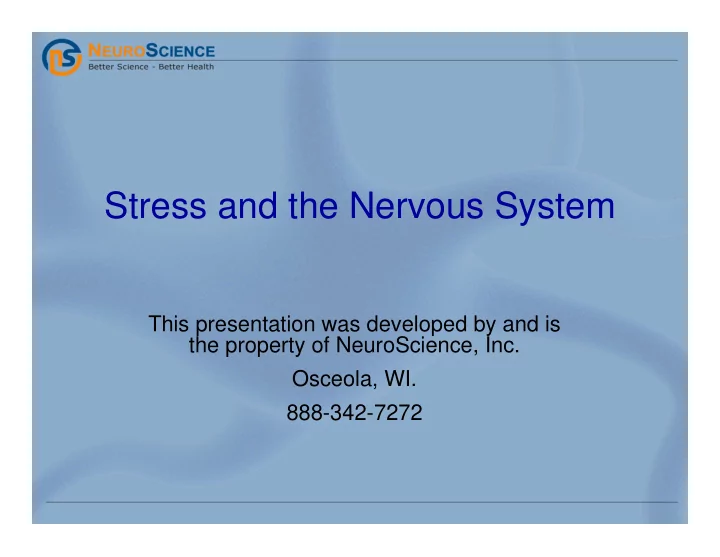

Stress and the Nervous System This presentation was developed by and is the property of NeuroScience, Inc. Osceola, WI. 888-342-7272
Presentation Objectives • Establish the role of hormones and neurotransmitters in stress • Discuss how the effects of stress can be measured • Provide options for helping individuals cope with the effects of stress
What is Stress? • The body’s response to challenging physical and mental events • Feeling stressed is a sequence of biochemical reactions inside the body • Controlled by the Nervous System
Hormones & Neurotransmitters (NT’s) • The body uses chemical messengers to manage stress – Hormones • Cortisol • DHEA – Neurotransmitters • Epinephrine • Norepinephrine • Serotonin • Dopamine
The body’s Response to Stress • When the body encounters a stressor, it releases hormones and neurotransmitters to help you handle the situation • Fight or flight response
The Stress Response System Stress H ypothalamus Stress “off” Switch Corticotropin Releasing Factor (CRF) Cortisol also P ituitary shuts off the stress response Adrenal- Corticotrophic Hormone (ACTH) A drenal Cortex Cortisol Epinephrine Adrenal Medulla DHEA Norepinephrine
The Role of Hormones & NT’s • Stress hormones and neurotransmitters – Provide a quick burst of energy – Speed up the necessary systems • Heart rate • Breathing – Shut down the unnecessary systems • Reproductive system • Immune system
Acute vs. Chronic Stress • Acute stress causes a rise, then fall, in the stress hormones and neurotransmitters • Chronic, day-to-day stress results in a system that is always in “overdrive” Chronic Stress Acute Stress (fight or flight) Hormone Hormone & NT levels & NT levels Overdrive ! Time Time
Effects of Chronic Stress • Too much time spent in “overdrive” can eventually lead to “burnout” Chronic Stress Overdrive ! Hormone & NT levels Burnout ! Time
Effects of Chronic Stress • Chronic stress (overdrive & burnout) may lead to significant imbalances in any one or more of your stress hormones and neurotransmitters • Imbalances in your stress chemicals may lead to other problems…
Overdrive & Burnout • Overdrive & Burnout: – Loss of control – Feelings of anxiousness – Inability to lose weight – “Wired but tired” – Little motivation – Sleep disruptions – Poor libido – Low mood – Headaches – Ready to snap – Fatigue
Ask Your Doctor! • If you are feeling over- stressed and burned out, ask your doctor to measure your levels of stress hormones & neurotransmitters.
What Next? • A simple urine/saliva test can determine your stress hormone and neurotransmitter balance.
Hormone & NT Testing • NeuroScience’s tests are covered by several major insurance companies: – Medicare – BlueCross/BlueShield – United Health Care – Aetna – Medica – Mutual Of Omaha
Test-Address • The information obtained from your laboratory test will be useful in determining methods to help you maintain balance.
The Biochemical Effects of Stress Presentation: F, 25 Base- Optimal Tired, trouble sleeping, line Range anxious- Cortisol (7 AM) 3.7 Very low 7.0-10.0 (12 PM) 3.2 Normal 3.0-6.0 Worn out and frazzled!!! (5 PM) 2.1 Normal 2.0-4.0 Discussion: (10 PM) 2.0 Elevated <1.5 Epinephrine 3.1 Low 8-12 Chronic stress may lead to Norepinephrine extremely low levels of the 11.6 Very low 35-60 stress hormones and Dopamine 72.9 Very low 110-175 neurotransmitters Serotonin 39.5 Very low 150-200 GABA 2.9 Normal 1.5-4.0
Addressing the Effects of Stress • Diet/nutritional considerations • Exercise • Targeted Amino Acid Therapy™ – To rebuild the body’s ability to manage stress via specific nutrients
Dietary/Nutritional Considerations • The body makes hormones and neurotransmitters from the foods you eat • Poor dietary habits may not provide sufficient amounts of the building blocks for neurotransmitters, called amino acids. • A balanced diet, with high-quality protein, provides the amino acids the body needs
Exercise Effects • Exercise is a healthy way to cope with the effects of stress • Exercise has positive effects on the stress hormones and neurotransmitters
Targeted Amino Acid Therapy™ • Specific ingredients that help support the body’s ability to make hormones & neurotransmitters • Specific ingredients that help the body manage stress properly • Naturally-derived, clinically dosed
Summary • Stress is a complex biological process that is influenced by many neurotransmitters and hormones. • A disruption in one or more of these parameters can lead to signs of stress. • Monitoring the balance of hormones and neurotransmitters may be useful in managing the outward signs of stress.
Summary • Laboratory tests can be used to assess hormonal and neurotransmitter balances. • A number of options exist to help individuals cope with the effects of stress, including: diet, exercise, and Targeted Amino Acid Therapy™. • Ask your doctor if NeuroScience’s products and services are right for you. www.neurorelief.com
Summary • Providing building blocks (amino acids) and supporting the biochemical pathways (vitamins) used to make neurotransmitters is a natural approach to help the body cope with the effects of everyday stress.
Recommend
More recommend